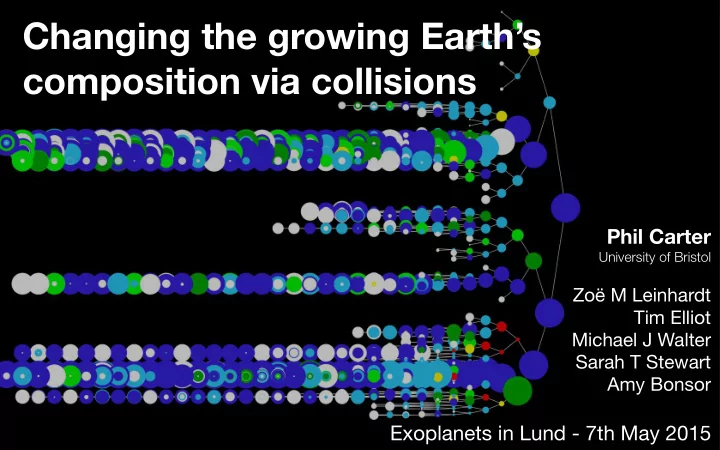

Changing the growing Earth’s composition via collisions Phil Carter University of Bristol Zoë M Leinhardt Tim Elliot Michael J Walter Sarah T Stewart Amy Bonsor Exoplanets in Lund - 7th May 2015
The problem with the Earth Formed from the same material ? Data from Palme & O’neill (2003) Bonsor, Leinhardt et al. 2015
The problem with the Earth Boyet & Carlson 2006 Superchondritic 142 Nd/ 144 Nd • Hidden reservoir • Inhomogeneous nebula • Collisions Boyet & Carlson 2005
Simulate accreting Earth • PKDGRAV - N body code • EDACM - Empirically Derived Analytical Collision Model (Leinhardt & Stewart 2011; Leinhardt et al. 2015) • 100 000 planetesimals, most ~200 km radius Marcus et al. 2010 • Particle radii inflated by factor f=6 to speed up evolution Run for 600 000 yr, effective time ~20 Myr • Mantle stripping law (Marcus et al. 2010) - favours accretion of core material by largest remnants GADGET SPH
Core vs mantle with EDACM Perfect merging Partial accretion Hit and run Projectile disrupted Erosion or supercatastrophic disruption
Resolution limit Collisions can produce debris, Resolved planetesimals reaccrete - cycling of material through debris bins Carter, Leinhardt et al. in prep
Growth of terrestrial embryos (no gas)
Growth of terrestrial embryos Carter, Leinhardt et al. in prep
What does this mean for the bulk composition? 0.22 0.35 Bonsor, Leinhardt et al. 2015
Carter, Leinhardt et al. in prep What effect does gas drag have? No gas Constant gas Decaying gas No gas Constant gas Decaying gas
Conclusions • A series of collisions can significantly alter the chemical composition of terrestrial planet embryos during runaway and oligarchic growth. • Compositional changes work both ways. If the Earth represents “core enhancement” other terrestrial planets should show “mantle enhancement”. • Collisional accretion during the growth of terrestrial embryos may do just enough to explain the non-chondritic nature of the Earth. The giant impact phase may further enhance the compositional changes. • Gas drag reduces the degree of variation seen in the composition after the oligarchic growth phase, but realistic gas discs that decay early in the growth of the Earth have only a small effect.
Recommend
More recommend